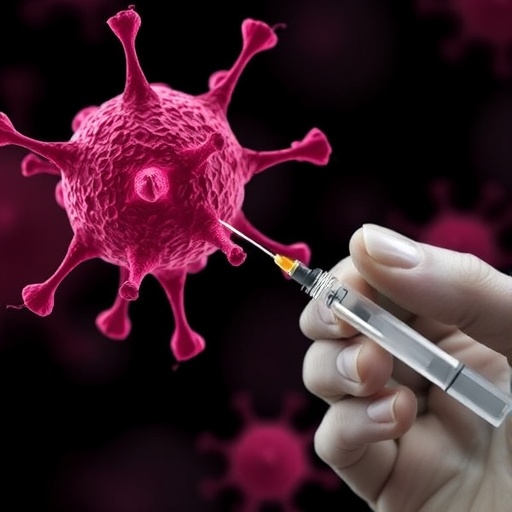A groundbreaking clinical trial is set to explore the potential of an innovative vaccine strategy aimed at reducing recurrence rates in women treated for vulvar high-grade squamous intraepithelial lesions (vHSIL), a precancerous condition linked to human papillomavirus (HPV) infection. The VulVaccin trial, registered under ClinicalTrials.gov identifier NCT06052696, represents one of the most comprehensive randomized placebo-controlled investigations into the adjuvant use of the nonavalent HPV vaccine in women undergoing standard treatment for vHSIL. This development comes at a critical time, as vulvar cancer incidence continues to rise globally, with approximately 45,000 new cases diagnosed annually.
Vulvar cancer often develops from vulvar HSIL, a lesion strongly associated with persistent infection by high-risk HPV types. Although standard treatment modalities exist to remove or ablate these lesions, the clinical challenge persists due to a high recurrence rate, estimated to affect over 30% of patients. These recurrences can lead to severe physical discomfort and impose significant psychosocial burdens, underscoring the urgent need for adjunctive therapeutic strategies to mitigate the likelihood of disease relapse.
The VulVaccin trial protocol has been meticulously designed to assess whether immunization with the nonavalent HPV vaccine can serve as an effective adjuvant therapy to prevent the recurrence of vHSIL. The study aims to enroll 498 women diagnosed with vHSIL who will be randomly assigned to receive either the vaccine or a placebo alongside their standard treatment. This double-blind approach ensures unbiased assessment of vaccine efficacy, which is primarily measured by incidence of vHSIL recurrence within two years of treatment.
Beyond the primary outcome, the trial is uniquely positioned to provide insights into secondary endpoints such as the immunogenicity elicited by vaccination in this patient population. Detailed immunological analyses will probe the magnitude and durability of antibody responses against the nine HPV types included in the vaccine, elucidating potential mechanisms by which vaccination could confer protective effects against viral persistence and lesion recurrence.
In addition to immunologic endpoints, the study promises to yield valuable data on the vaccine’s impact on quality of life and cost-effectiveness. These parameters are vital in understanding the holistic benefits of vaccination in a vulvar cancer prevention context, potentially influencing future clinical guidelines and healthcare policy decisions.
Long-term follow-up is incorporated into the study design, allowing investigators to evaluate vaccine effectiveness beyond the immediate two-year window. Planned assessments at five and ten years post-treatment will monitor the sustained prevention of vHSIL recurrence and the incidence of progression to invasive vulvar malignancies, offering a rare longitudinal perspective on vaccine impact in a high-risk cohort.
The rationale for utilizing the nonavalent HPV vaccine is grounded in its broad spectrum of protection against nine HPV types, including the high-risk strains most commonly implicated in anogenital cancers. The vaccine’s success in preventing HPV-related cervical and oropharyngeal cancers has paved the way for investigating its therapeutic potential in vulvar disease, particularly when deployed as an adjunctive measure after lesion treatment.
Researchers highlight the significance of adopting an intention-to-treat analytical framework, which includes all randomized participants in the evaluation of outcomes regardless of protocol adherence. This methodological rigor enhances the reliability and external validity of the findings, supporting their applicability in real-world clinical settings.
If successful, the VulVaccin trial could revolutionize management approaches for women afflicted with vHSIL, offering a prophylactic immunization route to complement surgical or ablative interventions. Such an advancement would represent a paradigm shift from solely reactive treatment toward proactive cancer prevention.
The implications of this research extend beyond individual patient benefit; they also address broader public health objectives by potentially reducing vulvar cancer incidence and associated healthcare burdens. Widespread adoption of adjunctive HPV vaccination could decrease the need for repeated procedures, thereby lessening physical morbidity and psychological distress.
Moreover, by identifying correlations between vaccine-induced immunity and clinical outcomes, the study may illuminate immunological biomarkers predictive of recurrence risk. This knowledge could inform personalized treatment strategies, tailoring interventions based on individual immune responsiveness.
The VulVaccin trial’s design also reflects a commitment to rigorous safety monitoring, ensuring that the vaccine’s administration in this specific patient population does not incur any unforeseen adverse effects. This consideration is paramount given the vulnerable status of patients recovering from vulvar dysplasia treatment.
In sum, this landmark trial epitomizes the intersection of oncology, immunology, and preventive medicine, harnessing vaccine technology to confront the persistent challenge of vHSIL recurrence. Its findings are anticipated to furnish robust evidence delineating the role of HPV vaccination as an integral component of vulvar precancer management.
As clinical research continues to unravel HPV’s role in anogenital cancers, initiatives like VulVaccin underscore the transformative potential of vaccines not only as primary preventive tools but also as adjuvant therapies shaping the future landscape of cancer care.
The global medical community eagerly awaits the results of this ambitious trial, which may herald a new era where HPV vaccination extends benefits beyond prevention of initial infection toward durable control and eradication of precancerous lesions.
Subject of Research: Preventing recurrence of vulvar high-grade squamous intraepithelial lesions (vHSIL) using adjuvant nonavalent HPV vaccination.
Article Title: Adjuvant nonavalent HPV vaccination in women treated for vulvar HSIL, a randomized placebo-controlled trial; VulVaccin study protocol.
Article References:
Vaessen, V.J.G.M., van de Laar, R.L.O., Piso-Jozwiak, M. et al. Adjuvant nonavalent HPV vaccination in women treated for vulvar HSIL, a randomized placebo-controlled trial; VulVaccin study protocol. BMC Cancer 25, 903 (2025). https://doi.org/10.1186/s12885-025-14275-w
Image Credits: Scienmag.com
DOI: https://doi.org/10.1186/s12885-025-14275-w
Tags: adjuvant therapy for precancerous lesionsclinical trial for vulvar cancerhigh-grade squamous intraepithelial lesionsHPV vaccine trialinnovative vaccine strategies for womennonavalent HPV vaccineprevention of vulvar cancer recurrencepsychosocial impact of vulvar cancerrandomized placebo-controlled trialrecurrence rates in vHSILvulvar cancer incidence statisticsvulvar HSIL treatment





